#Renewal age
Text
"It is 70 years since AT&T’s Bell Labs unveiled a new technology for turning sunlight into power. The phone company hoped it could replace the batteries that run equipment in out-of-the-way places. It also realised that powering devices with light alone showed how science could make the future seem wonderful; hence a press event at which sunshine kept a toy Ferris wheel spinning round and round.
Today solar power is long past the toy phase. Panels now occupy an area around half that of Wales, and this year they will provide the world with about 6% of its electricity—which is almost three times as much electrical energy as America consumed back in 1954. Yet this historic growth is only the second-most-remarkable thing about the rise of solar power. The most remarkable is that it is nowhere near over.
To call solar power’s rise exponential is not hyperbole, but a statement of fact. Installed solar capacity doubles roughly every three years, and so grows ten-fold each decade. Such sustained growth is seldom seen in anything that matters. That makes it hard for people to get their heads round what is going on. When it was a tenth of its current size ten years ago, solar power was still seen as marginal even by experts who knew how fast it had grown. The next ten-fold increase will be equivalent to multiplying the world’s entire fleet of nuclear reactors by eight in less than the time it typically takes to build just a single one of them.
Solar cells will in all likelihood be the single biggest source of electrical power on the planet by the mid 2030s. By the 2040s they may be the largest source not just of electricity but of all energy. On current trends, the all-in cost of the electricity they produce promises to be less than half as expensive as the cheapest available today. This will not stop climate change, but could slow it a lot faster. Much of the world—including Africa, where 600m people still cannot light their homes—will begin to feel energy-rich. That feeling will be a new and transformational one for humankind.
To grasp that this is not some environmentalist fever dream, consider solar economics. As the cumulative production of a manufactured good increases, costs go down. As costs go down, demand goes up. As demand goes up, production increases—and costs go down further. This cannot go on for ever; production, demand or both always become constrained. In earlier energy transitions—from wood to coal, coal to oil or oil to gas—the efficiency of extraction grew, but it was eventually offset by the cost of finding ever more fuel.
As our essay this week explains, solar power faces no such constraint. The resources needed to produce solar cells and plant them on solar farms are silicon-rich sand, sunny places and human ingenuity, all three of which are abundant. Making cells also takes energy, but solar power is fast making that abundant, too. As for demand, it is both huge and elastic—if you make electricity cheaper, people will find uses for it. The result is that, in contrast to earlier energy sources, solar power has routinely become cheaper and will continue to do so.
Other constraints do exist. Given people’s proclivity for living outside daylight hours, solar power needs to be complemented with storage and supplemented by other technologies. Heavy industry and aviation and freight have been hard to electrify. Fortunately, these problems may be solved as batteries and fuels created by electrolysis gradually become cheaper...
The aim should be for the virtuous circle of solar-power production to turn as fast as possible. That is because it offers the prize of cheaper energy. The benefits start with a boost to productivity. Anything that people use energy for today will cost less—and that includes pretty much everything. Then come the things cheap energy will make possible. People who could never afford to will start lighting their houses or driving a car. Cheap energy can purify water, and even desalinate it. It can drive the hungry machinery of artificial intelligence. It can make billions of homes and offices more bearable in summers that will, for decades to come, be getting hotter.
But it is the things that nobody has yet thought of that will be most consequential. In its radical abundance, cheaper energy will free the imagination, setting tiny Ferris wheels of the mind spinning with excitement and new possibilities.
This week marks the summer solstice in the northern hemisphere. The Sun rising to its highest point in the sky will in decades to come shine down on a world where nobody need go without the blessings of electricity and where the access to energy invigorates all those it touches."
-via The Economist, June 20, 2024
#solar#solar power#solarpunk#hopepunk#humanity#electricity#clean energy#solar age#renewables#green energy#solar energy#renewable energy#solar panels#fossil fuels#good news#hope#climate change#climate hope
1K notes
·
View notes
Text
If I had a nickel everytime a cartoon series ending includes a gay couple opening a food stand/food truck ...
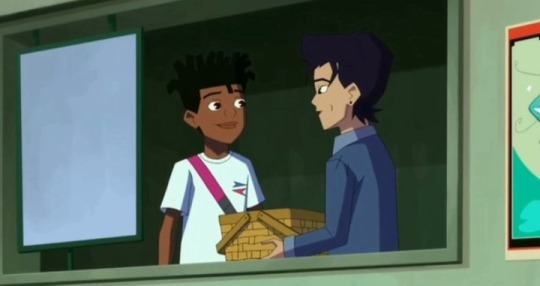
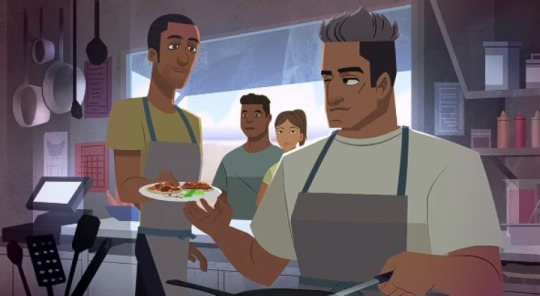
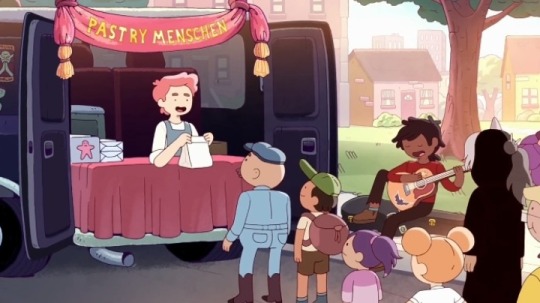
... i'd have 3 nickels, which isn't much but it's weird sweet that it happened three times
#I'd support their businesses#also hooraaay fionna and cake got renewed for a new season#fionna and cake#gumlee#garylee#marshall lee#gary prince#marshall x gary#carmen sandiego#carmen sandiego 2019#le chevre#el topo#le chevre x el topo#kipo#kipo and the age of wonderbeasts#benson x troy#kipo benson#kipo troy#mlm#mlm ship#gay#gay bois
2K notes
·
View notes
Text


why is this giving me the same vibe
#listen#the tlou brain rot has renewed in my brain for a while#and now I am comparing#ignore me#guard dog lovers protecting their partner is just so *chefs kisses*#I love the look Pedro gives Denzels character#oh I am gonna be unwell when this comes out#pedro pascal#tlou#joel miller#general acacius#also pedro pascal characters with age appropriate woman or older woman#love to see it#enough with the babies#I wanna see older woman too#anna torv you beauty#gladiator 2
130 notes
·
View notes
Text
Will posting shit like this when Hannibal goes on work trips purposely to piss him off:

#Hannibals just like for the love of god please eat a vegetable#you CANNOT get scurvy in this day and age PLEASE#Im a DOCTOR what will people think??#and Wills just like “ thats the point dickwad get fucked lmao”#expect +987 layers of pretentiousness#also they both dont know how twitter works and think theyre arguing in a private chat but no#its a public thread 💔#hannibal#nbc hannibal#hannibal nbc#netflix#hannibal netflix#renew hannibal#revive hannibal#will graham#hannibal lecter#hannigram
339 notes
·
View notes
Text
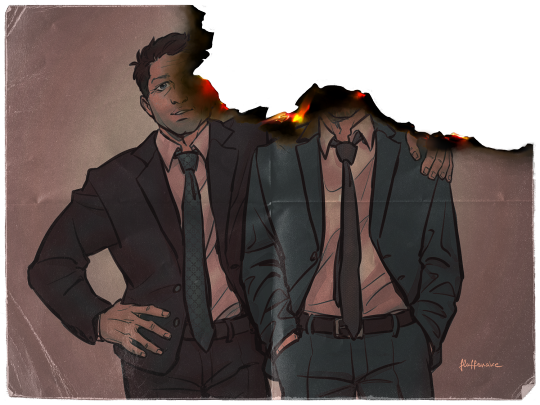
full picture below :^) ↓

#I didn't spend ages getting Jensen's face right as Bruce just to hide it in the end#my art#gotham knights#harvey dent#bruce wayne#dc comics#batman#two face#renew gotham knights#gotham knights fanart#misha collins#jensen ackles#if the transparent png gets turned into a jpg again after a while I am not responsible for my actions--
664 notes
·
View notes
Text

A quiet moment.
#Bless the renewed Dragon Age hype#It made me want to draw again#DA2#da fanart#dragon age#dragon age fanart#fenris#dragon age 2#fenhawke#Dani Hawke#My art
56 notes
·
View notes
Text
i was watching episode 7 of dead boy detectives today (certainly not for the third time) and i noticed that when charles and edwin were in the room with the spider baby thing edwin looked so scared
really insightful of me right
but he just seemed so SMALL like he was cowering behind charles and his posture wasn't perfect and he was just trying to be tiny and hidden and it made me so sad
there's no way he spent 70 years straight just running from this thing, i wonder how long he hid like that, how he developed this strategy over time to make himself seem like nothing in order to survive
also the way charles looks at him when he's like this is just devestating the body language/facial expression these actors use is incredible
#i realized like holy shit he looks like a little kid#a scared little kid#and it hit me like fuck. he kinda is. (he died at my current age but 🤫)#he just looked so small#and scared#like a lost puppy#i love edwin so much it is not fair#stop hurting my favorite repressed gayboy please#dead boy detectives#dead boy detective agency#dead boy detectives spoilers#dead gay detectives#renew dead boy detectives#edwin payne#charles rowland#payneland
29 notes
·
View notes
Text
#the gilded age#season 3 coming at us#im so excited#oh yes oh yes oh yes#my favorite series is coming back#thank you hbo#the gilded age renewed for a 3rd season#bertha russell#george russell#gladys russell#larry russell#marian brook#agnes van rhijn#ada brook-forte#oscar van rhijn#peggy scott#mrs. bruce#jack trotter#mrs. bauer#bridget tga
61 notes
·
View notes
Text
psssssst

ffxiv patches are back in my shop!
#I could also bring back the dragon age patches if anyone would buy them (etsy listings cost to renew so I'm holding back)#shameless self promotion
80 notes
·
View notes
Text
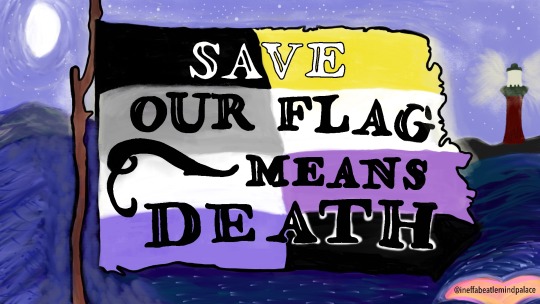
My submission for the @renewasacrew campaign.
#our flag means death#ofmd#renew as a crew#save our flag means death#save ofmd#gentlebeard#blackbonnet#we need to be a lighthouse#asexual#ace#nonbinary#aspec#ace pride#nonbinary pride#queer#fanart#thank you for the love!! haven’t drawn in ages so it means a lot#ofmd s3#ofmd season 3
43 notes
·
View notes
Text
"This year the world will make something like 70bn of these solar cells, the vast majority of them in China, and sandwich them between sheets of glass to make what the industry calls modules but most other people call panels: 60 to 72 cells at a time, typically, for most of the modules which end up on residential roofs, more for those destined for commercial plant. Those panels will provide power to family homes, to local electricity collectives, to specific industrial installations and to large electric grids; they will sit unnoticed on roofs, charmingly outside rural schools, controversially across pristine deserts, prosaically on the balconies of blocks of flats and in almost every other setting imaginable.
Once in place they will sit there for decades, making no noise, emitting no fumes, using no resources, costing almost nothing and generating power. It is the least obtrusive revolution imaginable. But it is a revolution nonetheless.
Over the course of 2023 the world’s solar cells, their panels currently covering less than 10,000 square kilometres, produced about 1,600 terawatt-hours of energy (a terawatt, or 1tw, is a trillion watts). That represented about 6% of the electricity generated world wide, and just over 1% of the world’s primary-energy use. That last figure sounds fairly marginal, though rather less so when you consider that the fossil fuels which provide most of the world’s primary energy are much less efficient. More than half the primary energy in coal and oil ends up as waste heat, rather than electricity or forward motion.
What makes solar energy revolutionary is the rate of growth which brought it to this just-beyond-the-marginal state. Michael Liebreich, a veteran analyst of clean-energy technology and economics, puts it this way:
In 2004, it took the world a whole year to install a gigawatt of solar-power capacity...
In 2010, it took a month
In 2016, a week.
In 2023 there were single days which saw a gigawatt of installation worldwide.
Over the course of 2024 analysts at BloombergNEF, a data outfit, expect to see 520-655gw of capacity installed: that’s up to two 2004s a day...
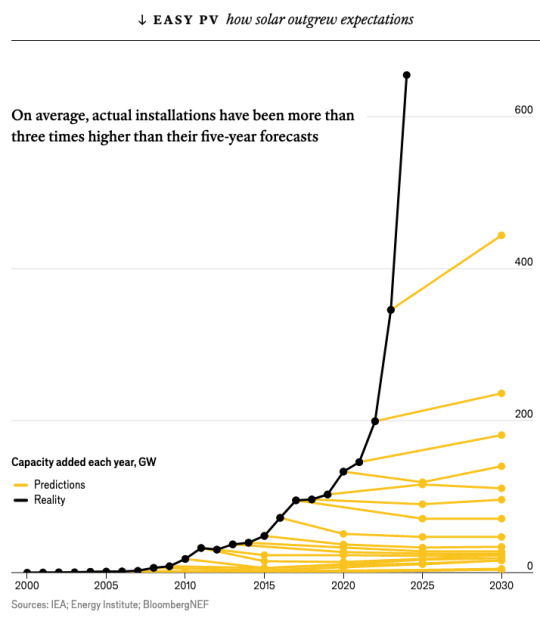
And it shows no signs of stopping, or even slowing down. Buying and installing solar panels is currently the largest single category of investment in electricity generation, according to the International Energy Agency (IEA), an intergovernmental think-tank: it expects $500bn this year, not far short of the sum being put into upstream oil and gas. Installed capacity is doubling every three years. According to the International Solar Energy Society:
Solar power is on track to generate more electricity than all the world’s nuclear power plants in 2026
Than its wind turbines in 2027
Tthan its dams in 2028
Its gas-fired power plants in 2030
And its coal-fired ones in 2032.
In an IEA scenario which provides net-zero carbon-dioxide emissions by the middle of the century, solar energy becomes humankind’s largest source of primary energy—not just electricity—by the 2040s...
Expecting exponentials to carry on is rarely a basis for sober forecasting. At some point either demand or supply faces an unavoidable constraint; a graph which was going up exponentially starts to take on the form of an elongated S. And there is a wide variety of plausible stories about possible constraints...
All real issues. But the past 20 years of solar growth have seen naive extrapolations trounce forecasting soberly informed by such concerns again and again. In 2009, when installed solar capacity worldwide was 23gw, the energy experts at the IEA predicted that in the 20 years to 2030 it would increase to 244gw. It hit that milestone in 2016, when only six of the 20 years had passed. According to Nat Bullard, an energy analyst, over most of the 2010s actual solar installations typically beat the IEA’s five-year forecasts by 235% (see chart). The people who have come closest to predicting what has actually happened have been environmentalists poo-pooed for zealotry and economic illiteracy, such as those at Greenpeace who, also in 2009, predicted 921gw of solar capacity by 2030. Yet even that was an underestimate. The world’s solar capacity hit 1,419gw last year.
-via The Economist, June 20, 2024
--
Note: That graph. Is fucking ridiculous(ly hopeful).
For perspective: the graph shows that in 2023, there were about 350 GW of solar installed. The 5-year prediction from 2023 said that we'd end up around 450 GW by 2030.
We hit over 600 GW in the first half of 2024 alone.
This is what's called an exponential curve. It's a curve that keeps going up at a rate that gets higher and higher with each year.
This, I firmly believe, is a huge part of what is going to let us save the world.
#solar power#solar energy#climate change#fossil fuels#solarpunk#hopepunk#solar age#optimism#renewable#renewable energy#clean energy#green energy#renewables#solar panels#good news#hope
544 notes
·
View notes
Text

Apothecary Qimir sketch for the girlies who likes their men a bit of a greasy loser. DANGEROUS☝️ but still a loser☝️
I'm still learning how to draw again so I'll probably post a lot of test sketches (or portrait studies maybe?) here
#qimir#apothecary qimir#the acolyte#the acolyte fanart#you think studying art is easy as you age but no it becomes more complicated#anyway love that oshamir is keeping me motivated to pick up the damn pen again#renew the acolyte
15 notes
·
View notes
Text
the gilded age season three renewal! this is how we stay winning! can't wait for a whole new eight episodes of tightly scripted drama including but not limited to: being sold to a duke by your mother like he's a member of one direction, putting your sister in her place by paying the salaries of all her servants thus rendering her powerless, some bullshit about a clock again for some reason, and peggy living her best life and becoming a new york times best selling author.
#the gilded age#tga#literally so happy i was scared it wasnt going to get renewed#but we won#max can live for but another moment#anyways#cant wait to see mrs. winterton literally stab mrs. russell next season while mrs. astor watches
34 notes
·
View notes
Text
Findekáno's Tattoo
This was a part of Alqualondë that Findekáno had never been to before.
Really, he could say that about most of the Telerin city. He and his siblings and cousins were mostly interested in enjoying the beach when they ventured down from Tirion. They’d been to Olwë’s house (not really much of a palace, certainly nothing like Grandfather Finwë’s home) a couple times, too, what with Uncle Arafinwë marrying his daughter. But as a whole, Findekáno felt half lost as he searched for the shop he was looking for.
He’d gotten the name of the shop from an elf in Tirion who specialized in adorning the body. A common enough craft among the Noldor, though his parents would have objected to their son utilizing her services, given her reputation. He agreed with them on that, though more because she was bound to know about the family drama than because she was too liberal with her needle and ink.
No, no. For this he had to find an outsider, and Mórowen of the Teleri came well recommended.
Or, at least, recommended.
Findekáno stopped to squint at a driftwood sign polished nearly blank by the combination of saltwater spray and the fine sand carried by the wind and foot traffic all over the city. This looked like the shop he’d been directed to. The only way to know was to go inside and face whatever awaited.
Pushing aside the strings of seashells decorating the entrance, he stepped into the small shop.
“In a minute.” The sharp words came from a black-hair elf, uncommon for a Teleri, hunched over a low table.
“Mhph,” the elf laying face-down on the table said as Mórowen tapped her tattooing comb into their back.
Embarrassed (and more than a little flustered at seeing someone half naked), Findekáno ducked back into the street to wait.
Well over a minute passed before the Teleri, still indecently underdressed, walked out, accompanied by a taller elf he hadn’t noticed. The freshly tattooed patron offered the waiting prince a casual greeting gesture that broke off with a wince. The bigger elf laughed and then they were gone.
He hesitated at the lintel. Did he really want to do this?
“Come, come,” Mórowen said. “Don’t block the light.”
“Hello.” He tried to calm his nerves as he stepped into the tiny shop, more of a shack compared to what he was used to. “I heard you craft adornments for the skin?”
She snorted. “If your clothes or face were not enough, I’d know you're a Noldo now. Yes, I do.”
He stumbled over his tongue. The last time he’d been this embarrassed had to be when he slipped at the feast and landed in Maitimo’s lap, spilling wine all over both of them. Their fathers saw the whole thing and Maitimo quickly excused himself and fled.
“Sit down.” Mórowen pointed at a three-legged stool next to the table. “What do you want?”
It wobbled dangerously under him. “I-” there was no going back now, he’d come all this way and he’d see this through. “I’d like a tattoo.”
“And every fisher wants Ossë to not break their nets. Do you know what you want?”
He had the sudden urge to hide his hands behind him. The way her eyes flicked up and down made him feel like she was picking which spot of exposed skin to set her au to first. His answer came out in a rush. “A name.”
She sat back on her work stool, tapping one finger on the table. “A name?” Her eyebrows rose.
He wasn’t sure if it was mocking. He thought it could be. “Yes. Maitimo.”
From a pocket, he pulled a scrap of linen paper. He’d drawn the name out to look exactly the way he wanted, with extra flourishes. He stopped short of including hearts, but he’d wanted to.
Mórowen took the paper and inspected his work. “Maitimo,” she repeated and then read out each tangwa and ómatehta. “You want it to look like this?”
“Yes,” he insisted, defensive.
She shrugged. “Where?
“My side.” He’d thought for a long time about that. The tattoo had to go somewhere he would never casually reveal. “Just above my hip.”
“You’ll have to pull your shirt up,” she said it like she expected him to run out in a panic at the notion.
“Okay. Can we start now?”
She nodded. “I have time.”
In the course of a minute, Findekáno found himself lying on his side on the surprisingly comfortable table, his shirt bunched up under his arm and his pants pushed low on his hips. Mórowen’s hands were surprisingly warm against his skin but he couldn’t help flinching nervously with every foreign touch.
“Maitimo, Maitimo,” she murmured as she put ink to her comb. She paused with the comb’s teeth almost touching him.
He bit his lip and closed his eyes, bracing.
“Maitimo,” she repeated. “Isn’t he your cousin?”
Findekáno froze. “Half-cousin.”
“Aren’t your fathers feuding?”
Why was this Teleri, of all Teleri, reasonably informed on Noldorin politics? He thought they all had little interest in what happened beyond the shore. What would he have to do to convince her to forget about the whole thing and never speak a word of this to anyone? Father would be livid if he found out, and Maitimo might get in trouble too if Fëanáro heard about it.
“Eh, but perhaps I am mistaken,” she said and tapped the needles into his skin.
By the time Mórowen put her comb away and wiped his skin with a damp rag, Findekáno was almost regretting the whole thing. He wasn’t sure he could make the hike back up the mountain without his side tearing open. Even breathing made it hurt.
“Wash with cool water three times between minglings and pat it dry with rabbit fur.”
“Why?” He couldn’t imagine touching anywhere near the tattoo for at least a year.
She laughed. “You’ll know why if you don’t listen.”
“Now,” she hummed, helping him adjust his clothes so they fit right, “when your Maitimo is ready, send him to me for the other half.”
And with that, she bundled him out of her shop.
He stood in the street, sand accumulating inside his sandals again. He was not looking forward to the walk home. Maybe he could find someone in the market who would be driving a wagon back to Tirion and he could ride with them.
Already yearning for sleep, Findekáno set off toward the sounds of people arguing over prices and the good-natured conversations that seemed to be the hallmark of markets everywhere. He couldn’t resist tracing a finger over the name permanently inked into his skin as he went.
#and you know he's going to blot it out after maitimo abandons him to cross the ice#but because he learns nothing he's going to get a 'maedhors' tat to replace it once they renew their relationship#people have been getting the names of lovers tattooed on them for ages and finno is no exception#fingon#maedhros#the noldor#the teleri#alqualonde#aman#years of the trees#maedhros x fingon#russingon#the silmarillion#grimwing writes
13 notes
·
View notes
Text
Here's to hoping that the Hudson and Rex writers aren't watching The Rookie, and if they are, that they would choose to keep the "dog acts as a go-between" only in case Charlie wants to propose or something. In a joyous occasion.
#look everyone who knows me knows that I don't like it when my ships that take ages to get together split for ridiculous reasons#even temporarily#I don't ship chenford though#and since I don't ship it I'm not affected by all that stuff and the shippers who want to leave the show#like good riddance if they're so weak but why can't they hand in long enough to see where the two end up#even if it happened to my ship I would still want to see that (e.g. caskett)#well I've mixed three different shows in one post#(I'm definitely acting like hudson and rex has gotten renewed already lol)
15 notes
·
View notes
Text
The fact that the Volturi leaders were born in the Bronze Age 🤯
#the late Mycenaean period which was followed by the Bronze Age collapse#then the dark age#then the period we know as Ancient Greece#volturi#volturi coven#the volturi coven#the volturi#aro volturi#marcus volturi#caius volturi#twilight volturi#twilight saga#twilight renaissance#twilight renewal#twilight resurgance#twilight revival
61 notes
·
View notes